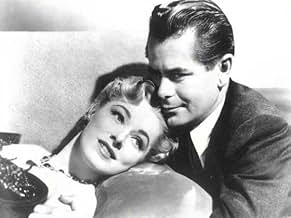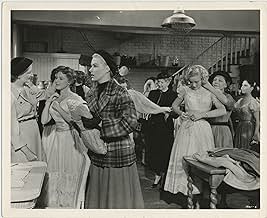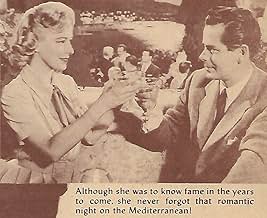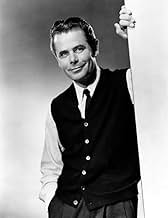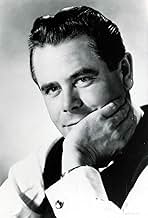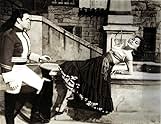IMDb RATING
6.7/10
1.3K
YOUR RATING
This movie chronicles Australian-born opera star Marjorie Lawrence's success, her battle with polio, and her eventual career comeback.This movie chronicles Australian-born opera star Marjorie Lawrence's success, her battle with polio, and her eventual career comeback.This movie chronicles Australian-born opera star Marjorie Lawrence's success, her battle with polio, and her eventual career comeback.
- Director
- Writers
- Stars
- Won 1 Oscar
- 1 win & 3 nominations total
Phyllis Altivo
- Louise
- (uncredited)
Benjie Bancroft
- Doctor
- (uncredited)
Francis Barnes
- Singer
- (uncredited)
Louise Bates
- Party Guest
- (uncredited)
Mary Bayless
- Backstage Well-Wisher
- (uncredited)
George Blagoi
- Audience Member
- (uncredited)
Heinz Blankenburg
- Baritone
- (uncredited)
Lulu Mae Bohrman
- Backstage Well-Wisher
- (uncredited)
- Director
- Writers
- All cast & crew
- Production, box office & more at IMDbPro
Featured reviews
Eleanor Parker is one of my favorite actresses from the '40s and '50s and does a marvelous job here, lip-synching to perfection various Wagnerian opera arias (as well as Puccini and Verdi). The storyline is somewhat similar to that of Jane Froman's career in that both were singers who, although paralyzed, continued with their singing careers and entertained servicemen as well. Glenn Ford lends solid support as the understanding, long-suffering husband who is always there when she needs his moral support. Roger Moore has a small role as her brother.
Everything moves smoothly under Curtis Bernhardt's direction. The opera segments are beautifully staged and filmed (in gorgeous technicolor, of course). Parker demonstrates her acting skills to the fullest and Eileen Farrell does a superb job on the vocal dubbing.
Well worth your time--inspirational and enjoyable even if you're not an opera lover. Filmed in wide screen technique, it loses something on video showings.
Everything moves smoothly under Curtis Bernhardt's direction. The opera segments are beautifully staged and filmed (in gorgeous technicolor, of course). Parker demonstrates her acting skills to the fullest and Eileen Farrell does a superb job on the vocal dubbing.
Well worth your time--inspirational and enjoyable even if you're not an opera lover. Filmed in wide screen technique, it loses something on video showings.
Eleanor Parker, a much underrated actress of the 1950s, probably hit the high point of her career when she essayed the role of Marjorie Lawrence in this biographical portrait.
Marjorie Lawrence was an Australian opera star whose career was cruelly interrupted by polio in the 1930s. The film follows Lawrence from her winning a singing contest in her native Winchelsea, Australia through her career with the Metropolitan Opera and her struggle with regaining her health. Lawrence is supported every step of the way by husband Dr. Thomas King,ably played by Glenn Ford. But it's Eleanor Parker's movie all the way.
Funny for a movie about an Australian, Parker doesn't even attempt an Australian accent. This is in the MGM tradition of Clark Gable who did not attempt any British accent in Mutiny on the Bounty. It worked just as well for Parker, though I'd be curious what a native Australian might think. Lawrence was the second female opera star who became a national treasure for Australia, the first being Nellie Melba. Parker shouldered a lot of tradition in this film and did it well.
The voice used by Parker for the operatic sequences is that of Eileen Farrell of the Metropolitan Opera. The sequences are well done, but the real drama in the scenes of Lawrence battling polio.
This film coincidentally enough came out at the same time that Dr. Jonas Salk discovered his vaccine preventive for polio. I still remember as a lad getting those polio shots at my public school. No movie studio could have planned that coincidence, but MGM reaped enormous profit because of it. As for Jonas Salk, no man of medicine has ever been admired in the same way in my lifetime.
Eleanor Parker was nominated for best actress, but lost that year to Anna Magnani in The Rose Tattoo. Look for a young Roger Moore in the role of Parker's brother and business manager.
My favorite scene in the whole film is Parker as Lawrence entertaining the troops overseas in World War II. Especially when she sings Waltzing Matilda to her native Australian diggers. It was like the whole beating heart of the Australian continent coming alive for an instant. Absolutely inspired.
This film gets the highest possible recommendation from me.
Marjorie Lawrence was an Australian opera star whose career was cruelly interrupted by polio in the 1930s. The film follows Lawrence from her winning a singing contest in her native Winchelsea, Australia through her career with the Metropolitan Opera and her struggle with regaining her health. Lawrence is supported every step of the way by husband Dr. Thomas King,ably played by Glenn Ford. But it's Eleanor Parker's movie all the way.
Funny for a movie about an Australian, Parker doesn't even attempt an Australian accent. This is in the MGM tradition of Clark Gable who did not attempt any British accent in Mutiny on the Bounty. It worked just as well for Parker, though I'd be curious what a native Australian might think. Lawrence was the second female opera star who became a national treasure for Australia, the first being Nellie Melba. Parker shouldered a lot of tradition in this film and did it well.
The voice used by Parker for the operatic sequences is that of Eileen Farrell of the Metropolitan Opera. The sequences are well done, but the real drama in the scenes of Lawrence battling polio.
This film coincidentally enough came out at the same time that Dr. Jonas Salk discovered his vaccine preventive for polio. I still remember as a lad getting those polio shots at my public school. No movie studio could have planned that coincidence, but MGM reaped enormous profit because of it. As for Jonas Salk, no man of medicine has ever been admired in the same way in my lifetime.
Eleanor Parker was nominated for best actress, but lost that year to Anna Magnani in The Rose Tattoo. Look for a young Roger Moore in the role of Parker's brother and business manager.
My favorite scene in the whole film is Parker as Lawrence entertaining the troops overseas in World War II. Especially when she sings Waltzing Matilda to her native Australian diggers. It was like the whole beating heart of the Australian continent coming alive for an instant. Absolutely inspired.
This film gets the highest possible recommendation from me.
I was fortunate enough to be chosen as the stunt double for Eleanor Parker in this extraordinary film. I was in awe of her performance and cannot say how much I enjoyed working with her for several of her films. I thought the script was marvelous and did win an award I believe. Eleanor Parker is the true lady she portrayed in this once in a lifetime film. I never tire of seeing it - over and over again.
I am a great-niece of Marjorie Lawrence. It's a very sad fact that Marjorie is best known outside of Australia. However, she was recently honored as one of 100 Australian Entertainers of the Century. It's also a bit of a shame that this movie is a Hollywood producer's interpretation of an American publisher's version of my Great-Aunt's life. The real family story is actually much more interesting. Auntie Marj never smoked a cigarette in her life - but it seems everyone smoked in the movies of the 50s. My mother and my aunt attended the world premiere here in Melbourne. I remember meeting Auntie Marj as a child in the 70s.
The film does a fine job with the crippling illness of Lawrence and her comeback onstage, but most notable are the performances by the stars. Glenn Ford and Eleanor Parker were never better. Just superb. The scene where she tried to commit suicide and Ford stopped her, broke down, and asked God for help is magnificent and a must-see. Ford and Parker should be well-remembered as excellent actors.
Did you know
- TriviaEleanor Parker can read music, and has perfect pitch as a singer. She decided to study the scores of the opera songs used in this movie on her own. She rented a cabin in Lake Arrowhead, California, and played the records while singing along, until she had the breathing and phrasing memorized. Then when filming the scenes, instead of lip-synching to the tracks recorded by Eileen Farrell for the movie, she sang full voice (but an octave lower). She is proud of the fact that they never had to do a re-take, in order to "match" the tapes. She nailed it on the first take every time.
- GoofsAfter Marjorie sings "Annie Laurie" and she wheels herself into the kitchen and she suggests a concert tour, right as she and Dr. King are embracing .
- Quotes
Marjorie Lawrence: [drinking champagne] Tonight I love the whole world and I want them to know it.
Dr. Thomas King: And tomorrow you'll have a monumental hangover.
Marjorie Lawrence: That's the advantage of going out with doctors.
- ConnectionsFeatured in 1955 Motion Picture Theatre Celebration (1955)
- SoundtracksDon Carlos
(1867) (uncredited)
Music by Giuseppe Verdi
Libretto by François Joseph Méry and Camille du Locle
Aria "O don fatale" Performed by Eleanor Parker (dubbed by Eileen Farrell) with piano accompaniment
- How long is Interrupted Melody?Powered by Alexa
Details
- Release date
- Country of origin
- Languages
- Also known as
- La melodía interrumpida
- Filming locations
- Production company
- See more company credits at IMDbPro
Box office
- Budget
- $2,367,000 (estimated)
- Runtime
- 1h 46m(106 min)
- Aspect ratio
- 2.55 : 1
Contribute to this page
Suggest an edit or add missing content



